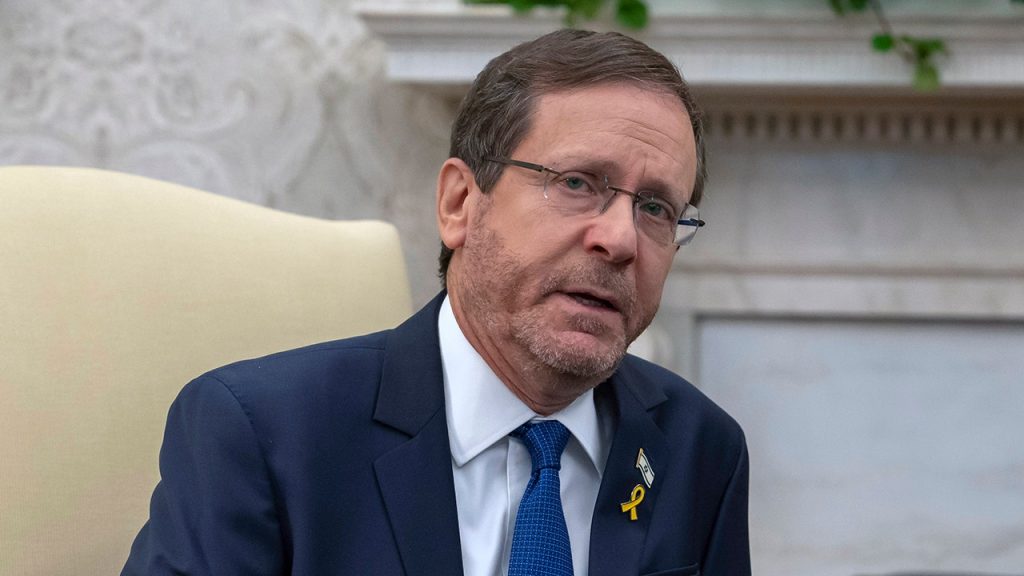In a recent appearance on national television, Israeli President Isaac Herzog addressed concerns regarding the U.S. involvement in the ongoing tensions between Israel and Iran. His comments coincided with the U.S. launching airstrikes on key Iranian nuclear facilities, actions perceived as a pivotal moment in the broader regional conflict. Herzog underscored that Israel is not forcing the U.S. into a military engagement, emphasizing the need for diplomatic channels while supporting Washington’s decision to act against perceived threats to global and American security.
| Article Subheadings |
|---|
| 1) Context of the U.S. Airstrikes on Iran |
| 2) The Diplomatic Stance of Israel |
| 3) Reactions from U.S. Officials |
| 4) Implications for U.S.-Iran Relations |
| 5) Future of Diplomacy in the Region |
Context of the U.S. Airstrikes on Iran
On a recent Saturday, the United States executed a series of airstrikes targeting three major Iranian nuclear facilities: Fordow, Natanz, and Isfahan. This military action has heightened concerns of escalating tensions not only between the U.S. and Iran but also among regional players in the Middle East. These facilities were identified as critical components of Iran’s nuclear ambitions, which many nations regard as a significant threat to regional stability and global security. The timing of these airstrikes follows intense deliberations within the U.S. government regarding how to effectively address Iran’s nuclear program and its implications for both the Middle East and global peace.
The Diplomatic Stance of Israel
In light of the U.S. military actions, President Isaac Herzog was keen to clarify Israel’s position on the matter. During an interview on CNN’s “State of the Union,” he stated emphatically that Israel is not a party dragging the U.S. into conflict, instead leaving the ultimate decision in the hands of U.S. leadership.
“We made clear throughout that we are not dragging America into a war,” Herzog articulated.
He characterized the Iranian nuclear program as a direct threat not just to Israel, but to the wider free world, emphasizing that America’s actions were a necessary step to mitigate risks associated with Iran’s military aspirations.
Reactions from U.S. Officials
Among U.S. officials, reactions to the airstrikes have varied, yet many echoed Herzog’s sentiments. Secretary of State Marco Rubio affirmed during an interview that the U.S. is “not at war” with Iran and that regime change is not a primary goal. There seems to be a concerted effort among U.S. leaders to portray the military responses as calculated and measured, aiming to protect national interests while avoiding outright war. This nuanced stance underscores a willingness to continue diplomatic engagement alongside military deterrence strategies.
Implications for U.S.-Iran Relations
The latest developments represent a complex junction in U.S.-Iran relations, characterized by increased conflict yet also the potential for renewed diplomatic endeavors. While military actions can serve to deter aggressive behaviors from Iran, they may also complicate future negotiations. President Herzog called for any future diplomacy to be “nuts and bolts and very clear” in its objectives, clearly reflecting Israel’s skepticism based on historical precedents where negotiations have faltered. The challenge remains to balance military and diplomatic efforts without escalating tensions further.
Future of Diplomacy in the Region
Looking forward, the pathway for diplomacy in addressing the Iranian nuclear issue is poised to be fraught with challenges. The Israeli position indicates a hesitancy to embrace traditional diplomatic avenues, given past failures attributed to Iranian intransigence. Herzog’s comments suggest that Israel will remain vigilant in monitoring Iranian actions, urging the U.S. not to overlook the potential for deception in negotiations. As tensions rise, the need for a robust, coherent diplomatic strategy will be critical for both Israel and the U.S. in navigating a path that avoids further conflict while addressing existential threats.
| No. | Key Points |
|---|---|
| 1 | U.S. conducted airstrikes on key Iranian nuclear facilities. |
| 2 | Israel clarifies it is not dragging the U.S. into a war. |
| 3 | Israeli defense against Iran’s nuclear ambitions is crucial for global security. |
| 4 | U.S. leadership stresses on diplomacy alongside military action. |
| 5 | Future diplomatic efforts must focus on clear objectives to avoid pitfalls. |
Summary
The current state of tensions between the U.S. and Iran has been escalated by airstrikes on Iranian nuclear facilities, prompting a complex dialogue between U.S. and Israeli officials regarding military involvement and diplomatic negotiations. President Isaac Herzog emphasized that Israel is not coercing the U.S. into conflict, and endorsed the airstrikes as a necessary measure to protect both Israeli and global interests. However, as both countries navigate this intricate situation, the importance of clear and direct diplomacy becomes increasingly apparent to avoid further escalation and misunderstanding.
Frequently Asked Questions
Question: What prompted the U.S. airstrikes on Iran?
The airstrikes were initiated due to concerns over Iran’s nuclear program, which was viewed as a clear threat to global and American security interests.
Question: How did Israel’s President respond to U.S. military action?
President Isaac Herzog stated that Israel is not dragging the U.S. into war and emphasized the importance of the U.S. decision in regard to national security.
Question: What diplomatic strategies are likely to be pursued following the airstrikes?
Future diplomacy may focus on establishing clear and structured negotiations to avoid misunderstandings and dishonesty, reflecting Israel’s concerns over Iran’s past negotiating behavior.


